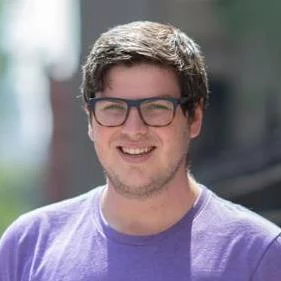Community building

Isaac Kurtz, a Hillel International Springboard Fellow at Hunter College Hillel, was raised in the “Jewish bubble.”
He attended modern Orthodox Jewish school, observed Shabbat weekly and spent his downtime with friends from school and shul.
After graduating from high school in balmy South Florida, Kurtz’s next step was a natural extension of his observant upbringing: yeshiva.
He spent the following year cutting his teeth on ancient Jewish text at Yeshivat Har Etzion in Israel. Although he remembers it as an enriching experience, he also recalls that he frequently asked himself, “Why am I sitting around learning Torah for 10 hours a day? Is this the most productive use of my time? Will this help me in the future?”
It was a year of “firsts” for Kurtz. It was the first time he reflected on his own Judaism, asking “why” instead of saying “this is just what we do.” It was the first time he davened with an egalitarian minyan, an experience he was able to partake in while on an Israel education program outside of his yeshiva.
Kurtz, now 22, continued to ask pointed questions and explore pluralism at Brandeis University, where he received his bachelor’s degree in political science and near eastern and Judaic studies. He quickly found his niche at Brandeis Hillel, participating in egalitarian services and serving as Israel program coordinator.
Kurtz also became active in Brandeis Bridges, a student-run organization that connects Jewish and black students through seminars, campus-wide events and a pilgrimage outside of Boston. With his peers, he discussed racial and religious relations on campus and explored Jewish and black history on weeklong trips to Ghana, Brazil and Chicago.
During his senior year, while crafting his resume and prepping for interviews, Kurtz mulled over his career priorities. For years, he was convinced he would become a lawyer. Entering the legal profession would be a rewarding career with a lengthy list of perks, including mental stimulation, the ability to help others, financial security and professional development opportunities.
But was it what he wanted?
The idea of a legal career lost its allure when he realized it didn’t reflect his passions. He wanted to be excited to go to work, not dread it.
“Everyone was telling me to become a lawyer, and maybe one day I will, but I realized it’s not what I wanted to pursue right after undergrad,” he said.
Kurtz found meaning in Judaism and empowering students through education. He accepted a position as a Hillel International Springboard Fellow at Hunter College Hillel, beginning his new role in July 2018.
Unlike Brandeis University, Hunter College has a large population of commuter students, with some traveling as long as 2.5 hours on buses, trains and ferries. And that plays into how Kurtz engages with them.
Because it’s unrealistic for students to schlep to campus for Shabbat every week, he’s helping them host Shabbat dinners from the comfort of their own homes. Students are provided with a Shabbat packet, complete with Jewish liturgy and a detailed checklist, as well as a catered kosher meal to share with nearby friends.
“Community building is the centerpiece of my Hillel work,” Kurtz said. “As a Hillel professional, so much of my job is about connecting students and helping them see themselves as part of the campus, not just students who show up, take classes and leave.”
To foster Jewish community on the campus grounds, Kurtz teaches “Pursuing Justice in the Jewish Tradition” and “Judaism as Art: A Search for Congruity,” which are part of the 10-week Jewish Learning Fellowship at Hunter Hillel.
He also facilitates meaningful dialogue between Jewish students and interfaith communities at Hunter College. Over winter break, some of those students participated in Maccabee Task Force’s Fact Finders, a multifaith trip to Israel. Kurtz, who led the eight-day trip, brought students to Jewish, Christian and Muslim religious sites, taught them about different cultures in Israel and discussed the Israeli-Palestinian conflict with them.
Kurtz hopes that his initiatives will continue to help students think deeply about their own Judaism, explore interfaith dialogue and make them feel a part of the campus community — no matter how far away they live.
He said, “I have to keep in mind the needs of our students while thinking about how our Jewish community can be integrated into their busy schedules.”